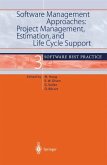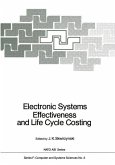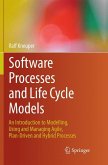Today, enterprises need more flexibility than ever before, but classic firms often
fail this requirement. Therefore, a more flexible kind of enterprise evolved: The
Virtual Enterprise. One reason why Virtual Enterprises are that flexible is their
extensive use of IT. Yet, given the temporary character of Virtual Enterprises, existing
software concepts are often not applicable. Multi-Agent Systems (MAS) may
help to solve this problem. However, a concept that allows cooperating agents to support the management of the complete life-cycle of a Virtual Enterprise, is still amiss. This book attends
to that gap. It identifies the management tasks of the Virtual Enterprise life-cycle,
determines those that may be performed by software agents, identifies preconditions
for their successful completion, and proposes an abstract architecture. The
architecture defines the structure of a MAS for Virtual Enterprise life-cycle support,
determines communication standards, interaction protocols and messages, and identifies
ontologies, that have still to be elaborated.
fail this requirement. Therefore, a more flexible kind of enterprise evolved: The
Virtual Enterprise. One reason why Virtual Enterprises are that flexible is their
extensive use of IT. Yet, given the temporary character of Virtual Enterprises, existing
software concepts are often not applicable. Multi-Agent Systems (MAS) may
help to solve this problem. However, a concept that allows cooperating agents to support the management of the complete life-cycle of a Virtual Enterprise, is still amiss. This book attends
to that gap. It identifies the management tasks of the Virtual Enterprise life-cycle,
determines those that may be performed by software agents, identifies preconditions
for their successful completion, and proposes an abstract architecture. The
architecture defines the structure of a MAS for Virtual Enterprise life-cycle support,
determines communication standards, interaction protocols and messages, and identifies
ontologies, that have still to be elaborated.








